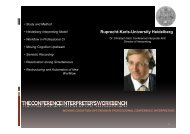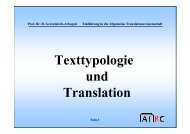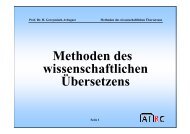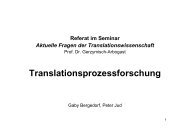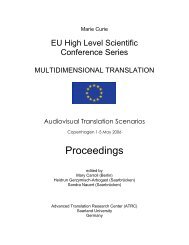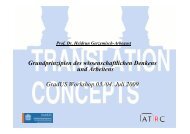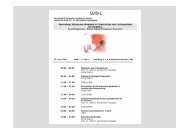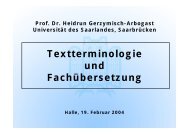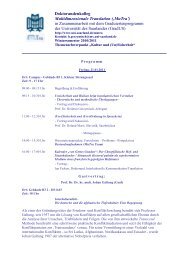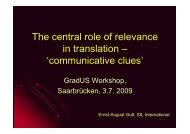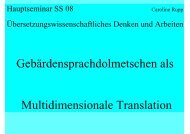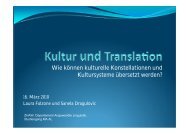Proceedings - Translation Concepts
Proceedings - Translation Concepts
Proceedings - Translation Concepts
You also want an ePaper? Increase the reach of your titles
YUMPU automatically turns print PDFs into web optimized ePapers that Google loves.
MuTra 2005 – Challenges of Multidimensional <strong>Translation</strong>: Conference <strong>Proceedings</strong><br />
Mira Kadric<br />
Can you apply the acquired competences in your<br />
individual working language(s)?<br />
Percent<br />
90<br />
80<br />
70<br />
60<br />
50<br />
40<br />
30<br />
20<br />
10<br />
0<br />
78.5<br />
20<br />
yes,very well partly not very well<br />
Diagram 10:<br />
Result of question ‘Can you apply the acquired competences in your<br />
individual working language(s)?’<br />
78.5% of the participants, which is the overwhelming majority, thought that they would<br />
be able to apply the acquired knowledge very well in their individual working language(s).<br />
20% of the participants expected to be able to at least partly apply the new competences in<br />
their working language(s). Of course, these results have only a limited validity. The<br />
participants only recorded their personal view because most of them had no practical<br />
experience at the time they filled in the questionnaire. It would be very interesting to question<br />
the same group after a certain period as to whether they were really able to use the<br />
competences acquired during the seminar in actual practice. However, the impression of the<br />
participants immediately after the seminar is, of course, also important and shows very<br />
positive results.<br />
4 Conclusions<br />
To sum up we can say that the analysis of the questionnaires filled in by the 130 course<br />
participants allows the conclusion that successful cross-language training is indeed possible<br />
(cf. also Gertrud Hofer’s description of similar projects in Switzerland). An assessment of<br />
whether cross-language teaching is more or less successful than language-specific teaching<br />
would require the organization of seminars for a specific language and the subsequent<br />
evaluation by means of the same questionnaire as used for this one.<br />
The short seminars described above of course surely do not impart all the competences<br />
necessary for working as a court interpreter nor could they offer enough practice during their<br />
duration of only a few days. However, the main goal of these seminars was to make the<br />
participants aware of the complexity of court interpreting and encourage them to occupy<br />
themselves with this subject matter in the future as well. The aim of the seminars was also to<br />
motivate the participants to continue developing their competences. This means especially<br />
that, when participating in a communicative situation in a multi-lingual and multi-cultural<br />
environment, they should pay attention not only to linguistic but also to non-linguistic aspects<br />
of communication and act professionally and within the boundaries of their individual roles.<br />
188



